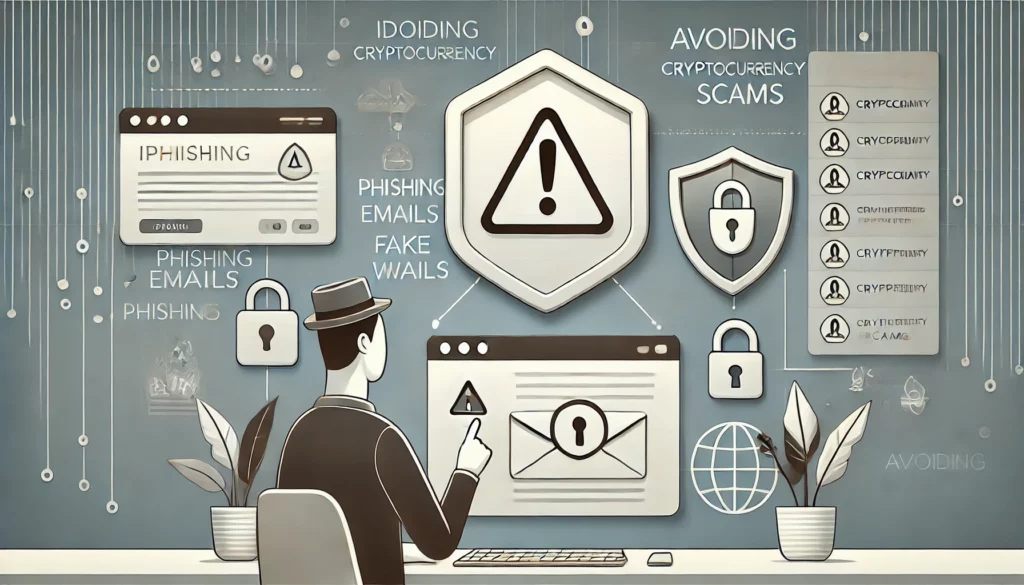The rise of cryptocurrencies has opened up new opportunities for investors and innovators, but it has also attracted scammers seeking to exploit the excitement and lack of regulation in the space. Crypto scams can take many forms, from fake investments to phishing schemes, and they continue to evolve as the market matures. Recognizing these scams and knowing how to avoid them is essential for protecting your assets.
Here’s a guide to understanding common crypto scams and the steps you can take to stay safe.
Common Types of Crypto Scams
1. Phishing Attacks
Phishing scams involve fraudulent attempts to steal your private keys, passwords, or other sensitive information by pretending to be a legitimate entity. This can occur via:
- Fake emails, websites, or social media accounts mimicking trusted exchanges or wallets.
- Malicious links that lead to phishing websites designed to capture your credentials.
How to Spot It:
- Look for subtle misspellings in URLs (e.g., “blockchain.cm” instead of “blockchain.com”).
- Be cautious of unsolicited emails or messages asking for personal information.
2. Rug Pulls
In a rug pull, scammers create a cryptocurrency project or DeFi token, promote it heavily, and then suddenly withdraw all funds, leaving investors with worthless tokens. These scams often occur in new or unverified projects.
How to Spot It:
- Projects with anonymous teams and no track record.
- Promises of unrealistic returns or guaranteed profits.
- Lack of audits or transparency in the project’s code.
3. Ponzi or Pyramid Schemes
These schemes promise high returns with little to no risk, funded by new investors rather than actual profits. As soon as new investor recruitment slows, the scheme collapses, leaving most participants at a loss.
How to Spot It:
- Rewards for recruiting new participants rather than generating revenue through real products or services.
- Emphasis on guaranteed returns, which are unrealistic in the volatile crypto market.
4. Fake ICOs (Initial Coin Offerings)
Scammers launch fraudulent ICOs to raise funds for non-existent projects. Once they collect enough money, they disappear, leaving investors with worthless tokens.
How to Spot It:
- No clear roadmap or whitepaper.
- Team members with unverifiable credentials.
- No active development or updates on the project.
5. Fake Wallets or Apps
Scammers create fake cryptocurrency wallets or apps to trick users into depositing their funds, which are then stolen.
How to Spot It:
- Apps not listed on official app stores or with suspiciously low user reviews.
- Requests for your private keys or seed phrases—legitimate wallets never ask for this information.
6. Giveaway Scams
These scams often appear on social media, with fake accounts impersonating well-known figures or companies promising to double your cryptocurrency if you send them funds.
How to Spot It:
- No legitimate company or individual will ask for funds in return for a “giveaway.”
- Check verified social media accounts to confirm if a promotion is real.
7. Pump-and-Dump Schemes
Scammers artificially inflate the price of a low-cap cryptocurrency by spreading hype or false news. Once the price surges, they sell their holdings, causing the price to crash and leaving other investors with losses.
How to Spot It:
- Unusual price spikes in obscure or low-volume tokens.
- Social media hype without any fundamental reasons for the price increase.
How to Avoid Crypto Scams
1. Conduct Thorough Research
Before investing in any cryptocurrency or project:
- Check the team: Are they transparent about their identities and qualifications?
- Review the roadmap: Does the project have clear, achievable goals?
- Analyze the community: Is there genuine engagement, or is it filled with bots and hype?
2. Use Reputable Platforms
Always use trusted exchanges, wallets, and DeFi platforms. Look for platforms with:
- A proven track record.
- Strong security measures, such as two-factor authentication (2FA).
- Positive reviews from reputable sources.
3. Never Share Your Private Keys or Seed Phrase
Your private keys and seed phrases are the keys to your cryptocurrency. No legitimate entity will ever ask for them. Always store this information offline in a secure location.
4. Verify URLs and Apps
- Double-check website URLs before entering sensitive information.
- Only download apps from official sources, such as the App Store or Google Play.
5. Be Skeptical of Unsolicited Offers
If you receive a message or email offering investment opportunities, giveaways, or asking for funds:
- Assume it’s a scam until proven otherwise.
- Verify the sender’s identity and confirm the legitimacy of the offer through official channels.
6. Check for Security Audits
Legitimate DeFi projects and tokens typically undergo third-party security audits. If a project hasn’t been audited or refuses to share audit results, proceed with caution.
7. Avoid FOMO (Fear of Missing Out)
Scammers often exploit emotions like greed and fear of missing out. Take your time to evaluate any investment opportunity critically, even if it seems urgent.
8. Stay Updated on Common Scams
The crypto space evolves rapidly, and so do scams. Follow trusted crypto news outlets and communities to stay informed about emerging threats.
What to Do If You’ve Been Scammed
- Report the Incident:
- Notify the platform where the scam occurred (e.g., exchange or wallet provider).
- Report the scam to local law enforcement or cybercrime units.
- Stop Further Losses:
- Move remaining funds to a secure wallet.
- Revoke permissions granted to suspicious apps or platforms via blockchain explorers like Etherscan or BscScan.
- Learn from the Experience:
- Reflect on what went wrong to prevent future losses.
- Share your story to warn others in the crypto community.
Final Thoughts
The cryptocurrency market offers immense opportunities but is also rife with risks, particularly for those unfamiliar with common scams. By conducting thorough research, using reputable platforms, and staying vigilant, you can protect yourself from falling victim to fraudulent schemes.
In crypto, knowledge is your best defense. Stay informed, trust your instincts, and always prioritize security over the fear of missing out.

